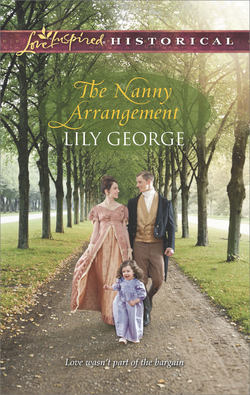Читать книгу The Nanny Arrangement - Lily George - Страница 14
ОглавлениеChapter Six
The weather was nothing short of abominable. One of those late spring showers that soaked a man to the bone and made mud of the most navigable roads. Rain ran in rivulets down Paul’s hat as he waited for the carriage to be pulled round, and he drew his overcoat closer to drive out the damp. The sooner they were started, the better. Perhaps they could make it as far as Derby before changing horses. The carriage plodded into view, its slow pace causing his pulse to quicken.
“Don’t spare the whip,” he remarked curtly to his driver as he placed his foot on the board. “We want to get ahead of this weather if at all possible. The roads aren’t a sea of mud yet. Give the horses their heads.” He gave a brief nod to the grooms, who had taken advantage of the rain to move up front onto the box, as he climbed into carriage.
“Aye, sir,” the coachman replied. His tone sounded doubtful, though.
Well, that was simply too bad. Even if his driver had some misgivings about his orders, he was bound to obey them.
The coachman’s whip cracked through the air and the carriage leaped forward. Paul removed his overcoat and cast his hat aside. Then he settled against the squabs and watched Kellridge retreat into the distance. Who knew when he would see it again? ’Twould be months at least.
Guilt gnawed at his insides. He shouldn’t leave. He could turn the horses around now, and no one would say anything. Well, that wasn’t true. The gossip in the servants’ halls would natter on endlessly, for the master never changed his plans, and already he had dithered over the day of his departure. His uniform and practical way of living had been severely thrown since Becky’s arrival, and he simply had to gain mastery over his own life again.
Kellridge would get on just fine. That was why he ran things the way he did. Besides, he had business in London. Selling Father’s shipping shares would grant him a tidy profit and dispose of a responsibility that he had grown too mired within. Everything would be attended to in his absence. The greatest reward lay in knowing he could run with the most decadent crowd in London, and no matter how dissipated his company or his time spent, Kellridge would be waiting for him when it came time for all revelry to cease.
The carriage bounced and jerked along the roads. Was it the high rate of speed that caused such a well-sprung carriage to jostle about? He usually traveled at an alarming pace, so surely that wasn’t it. Perhaps the rain was already making a mess of the roads. Oh, well, nothing to do but endure it. Once they reached Derby, he’d enjoy a fine dinner and perhaps play cards with the innkeeper. He always was a good chap, up for a game at a moment’s notice.
Paul wedged himself into a corner, which eased some of the discomfort of his travel. He could prop his head against one of the cushions and get a good nap in. ’Twas better to do so now, when en route to London. Once he reached his townhome, he’d get precious little sleep.
The carriage gave a violent jounce and skidded down a length of the road. His horses whinnied, his coachman cursed, and through the mixed and jumbled noise of chaos, he discerned the sickening and undeniable sound of splintering wood. He braced himself against the side of the carriage but was thrown like a rag doll. His head bashed against the window, which was odd because now the window was where the floor should be, and hundreds of drops of water splashed his face. No—they cut his face. ’Twas not water, ’twas broken glass.
As the carriage’s mad flight ground to a halt, Paul put tentative fingers to his cheeks and discerned a warm, sticky trail of blood.
“Are you all right, sir?” the coachman cried out from above him—far above him, and not through the window, but through the carriage door, which was now where the ceiling had been. The coachman whistled softly. “You look as though you lost the fight.”
“Thank you for that.” Paul sat up gingerly, withdrawing his handkerchief from his jacket pocket and holding it to his face. “What on earth happened?”
“Has to be a broken axle.” The coachman heaved himself on top of the door and extended his hand down to Paul. “I know Jim was worried about that right front wheel. The grooms are taking a look at the damage now.”
Paul allowed himself to be pulled upright, and then heaved himself through the door and onto the curiously slanting side of the coach. He slid down and sank onto the muddy road, pressing the handkerchief to his face to stop the bleeding. “This is what comes of changing plans,” he muttered.
The rain picked up in earnest, and thunder boomed in the distance.
“Aye, it’s a broken axle,” one of the grooms shouted. “Can’t repair it here.”
Paul struggled to his feet, his cheek throbbing. “We need to get back to Kellridge. From there we can get enough hands out to set the carriage right, and bring it back for repairs.” He turned to his coachman. “How far are we from home?”
“Riding at our usual pace, I’d say we’re only half an hour away,” the coachman replied. “Walking, I’d say about an hour.”
